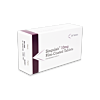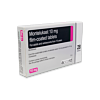Singulair
(Montelukast Sodium, Montelukast)-
All Strengths
-
10mg

Please Note: Manufactured by Merck Sharp in the Netherlands.

What is a generic medication?
Generic medications are significantly discounted copies of brand name medication that have the same active ingredients, intended use, dosage, side effects, effects, and route of administration as the original brand name medication. In other words, generic medications have the same pharmacological effects as their brand-name counterparts. Over half of all prescribed medications are for generic medications.



Singulair Drug Information
Are you paying too much for Singulair? Save up to 80% when purchasing your prescription drugs from Medix Pharmacy. Our prescription service aspires to conveniently provide you with affordable medications at the lowest prices in Canada and internationally.
We’re working with a number of Canadian and international pharmacy partners, all licensed by their qualified governmental regulatory bodies. By collaborating with our partners, we are able to offer a wide range of brand and generic medications at very competitive prices. You can obtain discount prescription drugs through our online pharmacy. Our prices are already up to 80% lower than your local pharmacy. We are committed to providing you with the best service and prices. This is why we’ll match the price of any of our online pharmacy competitors who require a valid prescription.
Order Singulair at a discount price today!
Why Buy Singulair from Medix Pharmacy?
We are the global leader in online prescription drug savings with almost 20 years of experience supplying prescription and over the counter drugs to our international customers. More than 300,000 international patients have used our service to receive their prescription and over-the-counter medications.
In the past two decades together with our international pharmacy partners we have shipped over 2 million prescription medication orders to our satisfied customers.
Your safety is our top priority. You can feel completely secure purchasing through us. We use SSL encryption to secure all of your personal information that is transferred through our website while using our service.
How Long Does It Take to Receive My Singulair Order?
You can easily place an order on our website in under 5 minutes. First you need to set up an account with us, create a payment method, and send us your prescriptions. Alternatively, you can order by downloading our order form or by placing an order over the phone. Delivery can take approximately 2 weeks to North America, and 4 weeks to other countries.
Singulair Overview
Montelukast is used to control and prevent symptoms caused by asthma (such as wheezing and shortness of breath). It is also used before exercise to prevent breathing problems during exercise (bronchospasm). Singulair can help decrease the number of times you need to use your quick relief inhaler. Montelukast is also used to relieve symptoms of hay fever and allergic rhinitis (such as sneezing, stuffy/runny/itchy nose). Since there are other allergy medications that may be safer (, Singulair should be used for this condition only when you cannot take other allergy medications or they do not work well. Singulair must be used regularly to be effective. It does not work right away and should not be used to relieve sudden asthma attacks or breathing problems. If an asthma attack or sudden shortness of breath occurs, use your quick-relief inhaler as prescribed. Singulair works by blocking certain natural substances (leukotrienes) that may cause or worsen asthma and allergies. It helps make breathing easier by reducing swelling (inflammation) in the airways.
Singulair Warnings
Singulair may rarely cause serious mental/mood changes. These effects may occur even after the medication has been stopped. Tell your doctor right away if you or a caregiver/family member notice symptoms such as agitation, anxiety, abnormal dreams, depression, memory/attention problems, hallucinations, trouble sleeping, or changes in behavior (such as aggression, hostility, restlessness, sleepwalking, suicidal thoughts/attempts). Talk to your doctor about the risks and benefits of Singulair.
How to Use Singulair
Read the Medication Guide provided by your pharmacist before you start taking montelukast and each time you get a refill. If you have any questions, ask your doctor or pharmacist. Take Singulair by mouth with or without food as directed by your doctor. The Dosage of Singulair is based on your age and medical condition. If you are using the chewable tablets, chew them thoroughly before swallowing. If your child cannot safely chew and swallow them, consult the doctor or pharmacist for advice. Take Singulair at the same time each day. If you are taking Singulair for asthma or for both asthma and allergies, take your dose in the evening. If you are taking montelukast to prevent only allergies, take your dose either in the morning or the evening. If you are taking Singulair to prevent breathing problems during exercise, take your dose at least 2 hours before exercise. Do not take more than one dose in 24 hours. Do not take a dose before exercise if you are already taking Singulair daily for asthma or allergies. Doing so may increase the risk of side effects. Do not increase or decrease your dose or stop using Singulair without consulting your doctor. Continue to use Singulair regularly to keep your asthma under control, even during sudden asthma attacks or periods when you have no asthma symptoms. Continue to also take other medications for asthma as directed by your doctor. Singulair works over time and is not meant to relieve sudden attacks of asthma. If an asthma attack or other breathing problem occurs, use your quick-relief inhaler as prescribed. You should always have a quick-relief inhaler with you. Consult your doctor or pharmacist for more details. Get medical help right away if your asthma symptoms worsen and your quick-relief inhaler is not helping. Tell your doctor promptly if asthma symptoms, breathing problems, allergy symptoms, number of times you use your rescue inhaler last or get worse.
Singulair Precautions
Before taking montelukast, tell your doctor or pharmacist if you are allergic to it; or if you have any other allergies. Singulair may contain inactive ingredients, which can cause allergic reactions or other problems. Talk to your pharmacist for more details. Before using Singulair, tell your doctor or pharmacist your medical history,liver disease, mental/mood problems (such as anxiety, depression, thoughts of suicide). Before having surgery, tell your doctor or dentist about all the products you use (including prescription drugs, nonprescription drugs, and herbal products). The chewable tablets may contain aspartame. If you have phenylketonuria (PKU) or any other condition that requires you to limit/avoid aspartame (or phenylalanine) in your diet, ask your doctor or pharmacist about using Singulair safely. During pregnancy, Singulair should be used only when clearly needed. Discuss the risks and benefits with your doctor. Singulair passes into breast milk. Consult your doctor before breast-feeding.
Singulair Misdose
If you miss a dose of Singulair, skip the missed dose. Take your next dose at the regular time. Do not double the dose to catch up. Do not take more than 1 dose in 24 hours.
Singulair Interactions
Drug interactions may change how your medications work or increase your risk for serious side effects. This document does not contain all possible drug interactions. Keep a list of all the products you use (including prescription/nonprescription drugs and herbal products) and share it with your doctor and pharmacist. Do not start, stop, or change the dosage of any medicines without your doctor's approval.
Singulair Side Effects
Remember that Singulair has been prescribed because your doctor has judged that the benefit to you is greater than the risk of side effects. Many people using Singulair do not have serious side effects. Tell your doctor right away if you have any serious side effects,numbness/tingling/shooting pain in the arms or legs, sinus pain/swelling, muscle weakness, uncontrolled muscle movements, stuttering. A very serious allergic reaction to Singulair is rare. However, get medical help right away if you notice any symptoms of a serious allergic reaction,rash, itching/swelling (especially of the face/tongue/throat), severe dizziness, trouble breathing. This is not a complete list of possible side effects. If you notice other effects not listed above, contact your doctor or pharmacist. Call your doctor for medical advice about side effects. You may report side effects to FDA at 1-800-FDA-1088 or at www.fda.gov/medwatch. In Canada - Call your doctor for medical advice about side effects. You may report side effects to Health Canada at 1-866-234-2345.
Singulair Storage
Store at room temperature away from light and moisture. Do not store in the bathroom. Keep all medications away from children and pets. Do not flush medications down the toilet or pour them into a drain unless instructed to do so. Properly discard Singulair when it is expired or no longer needed. Consult your pharmacist or local waste disposal company.
IMPORTANT DISCLAIMER: All medical content is supplied by a third party company who is independent from this web site. As such, this web site can not guarantee the reliability, accuracy, and /or medical efficacy of the information provided. In all circumstances, you should seek the advice of a health professional pertaining to drug, treatment and/or medical condition advice. Note that not all products are shipped by our contracted Canadian pharmacy. This website contracts with dispensaries around the world that ship products directly to our customers. Some of the jurisdiction include but are not limited to United Kingdom, Europe, Turkey, India, Canada, Vanuatu, Mauritius, and USA. The items within your order may be shipped from any one of these jurisdiction depending on the availability and cost of the products at the time you place your order. The products are sourced from these countries as well as others. Please note that the product appearance may vary from actual product received depending on availability.
